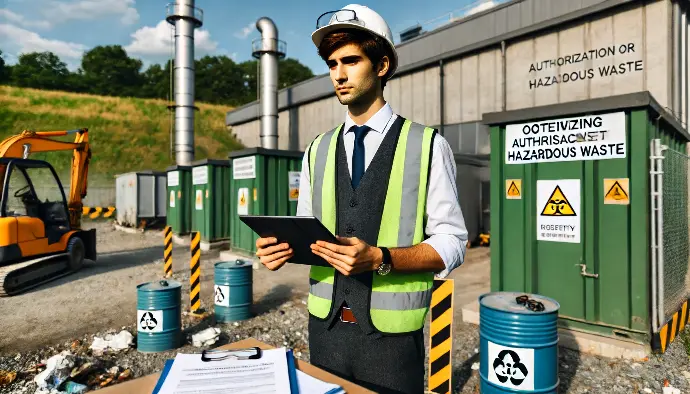Overview
In India, the management and handling of hazardous waste is a critical environmental concern. To ensure the safe disposal, recycling, and reduction of hazardous waste, the Indian government has established the Hazardous Waste (Management and Handling) Rules. These regulations are designed to protect human health and the environment from the potential dangers of hazardous waste.
Obtaining the necessary authorization or consent under these rules is essential for businesses and industries that generate, collect, transport, treat, or dispose of hazardous waste. This authorization is a legal requirement and demonstrates a company's commitment to environmental sustainability and regulatory compliance.
Hazardous waste includes substances that are toxic, flammable, corrosive, or reactive and can pose significant risks if not managed properly. The improper handling of such waste can lead to soil and water contamination, air pollution, and serious health hazards for humans and wildlife. Therefore, strict adherence to the Hazardous Waste (Management and Handling) Rules is vital.
The process of obtaining authorization involves a thorough assessment of the waste generated, its impact on the environment, and the measures in place for its safe management. Companies must ensure they have the proper facilities and procedures to handle hazardous waste safely and responsibly. This not only helps in complying with legal norms but also enhances the company's reputation and trust among stakeholders.
The approval process involves various stages, including the submission of detailed documentation, site inspections, and compliance audits. Once authorized, companies must maintain records of their hazardous waste management activities and submit periodic reports to the regulatory authorities.
About Approval
Obtaining approval under the Hazardous Waste (Management and Handling) Rules is a mandatory requirement for industries dealing with hazardous waste. This approval signifies that the company meets the necessary standards for the safe management and disposal of hazardous waste.
The approval process begins with the submission of an application to the State Pollution Control Board (SPCB) or the Pollution Control Committee (PCC) in the Union Territories. The application must include comprehensive details about the type and quantity of hazardous waste generated, the methods of storage, treatment, and disposal, and the measures taken to mitigate environmental impact.
Once the application is submitted, the regulatory authority reviews the information and conducts site inspections to ensure compliance with the prescribed standards. The inspection includes evaluating the waste management facilities, safety protocols, and environmental safeguards in place.
If the company meets all the requirements, the SPCB/PCC grants the authorization, which is typically valid for a specified period. The company must renew the authorization periodically and remain compliant with any updated regulations or guidelines.
Failing to obtain the necessary authorization can result in legal actions, including fines and penalties, and can severely impact the company's operations and reputation. Therefore, it is crucial for businesses to prioritize obtaining and maintaining this approval.
Applicability
The Hazardous Waste (Management and Handling) Rules apply to a wide range of industries and activities, including:
- Manufacturing industries that produce hazardous by-products.
- Healthcare facilities generating biomedical waste.
- Chemical and pharmaceutical industries.
- Waste treatment and disposal facilities.
- Recycling units handling hazardous materials.
- Transporters of hazardous waste.
Compliance with these rules is mandatory for any entity involved in the generation, collection, transportation, treatment, or disposal of hazardous waste.
Legal Provisions
The legal provisions under the Hazardous Waste (Management and Handling) Rules include:
- Rule 4: Responsibilities of the occupier for safe handling and disposal of hazardous waste.
- Rule 5: Procedure for obtaining authorization.
- Rule 6: Storage, treatment, and disposal guidelines.
- Rule 8: Packaging, labeling, and transportation requirements.
- Rule 9: Reporting and record-keeping obligations.
- Rule 11: Conditions for import and export of hazardous waste.
- Rule 13: Responsibilities of operators of disposal facilities.
Where to Obtain
The authorization for handling hazardous waste can be obtained from:
- State Pollution Control Boards (SPCBs): Responsible for granting authorizations within their respective states.
- Pollution Control Committees (PCCs): Handle authorizations in Union Territories.
- Central Pollution Control Board (CPCB): Provides guidelines and oversight for SPCBs and PCCs.
These authorities ensure that applicants comply with the Hazardous Waste (Management and Handling) Rules and provide the necessary support and information throughout the application process.
Procedure
The procedure for obtaining authorization under the Hazardous Waste (Management and Handling) Rules involves the following steps:
1. Application Submission:
- Prepare an application with details about the type and quantity of hazardous waste generated.
- Include information about storage, treatment, and disposal methods.
- Submit the application to the respective SPCB or PCC.
2. Documentation Review:
- The regulatory authority reviews the submitted application and documents.
- Additional information or clarification may be requested.
3. Site Inspection:
- An inspection team visits the facility to assess compliance with safety and environmental standards.
- The inspection includes evaluating waste management practices, safety measures, and environmental protection protocols.
4. Compliance Verification:
- The authority verifies that the facility meets all the requirements and standards.
- Any non-compliance issues must be addressed and rectified.
5. Approval and Authorization:
- If the facility complies with the rules, the SPCB or PCC grants the authorization.
- The authorization is typically valid for a specified period, after which it must be renewed.
6. Record Keeping and Reporting:
- Authorized facilities must maintain detailed records of their hazardous waste management activities.
- Periodic reports must be submitted to the regulatory authority.
Documents Required
The documents required for obtaining authorization include:
- Application form duly filled and signed.
- Details of hazardous waste generated (type, quantity, and source).
- Waste management plan outlining storage, treatment, and disposal methods.
- Proof of ownership or lease of the facility.
- Environmental Impact Assessment (EIA) report, if applicable.
- Safety protocols and emergency response plans.
- Copy of previous authorization (for renewals).
- Consent to Operate (CTO) from the SPCB or PCC.
Fees
The fees for obtaining authorization under the Hazardous Waste (Management and Handling) Rules vary depending on the type and scale of operations. The exact fee structure can be obtained from the respective SPCB or PCC.
Authority
The State Pollution Control Boards (SPCBs) and Pollution Control Committees (PCCs) are the primary authorities responsible for granting authorization under the Hazardous Waste (Management and Handling) Rules. They ensure compliance with environmental regulations and provide guidance to industries on safe waste management practices.
Application Mode
Applications for authorization can be submitted both online and offline. The online application process is facilitated through the respective SPCB or PCC websites, providing a convenient and efficient way to apply.
Time Limit
The time limit for obtaining authorization varies but typically ranges from 60 to 90 days from the date of application submission.
FAQs
Hazardous waste includes materials that are toxic, flammable, corrosive,
or reactive and can pose serious risks to health and the environment.
Authorization ensures safe handling, treatment, and disposal of
hazardous waste, protecting human health and the environment.
Industries generating, collecting, transporting, treating, or
disposing of hazardous waste must obtain this authorization.
The validity period varies but is typically specified in the
authorization document and requires periodic renewal.
Non-compliance can result in legal actions, including fines and
penalties, and can adversely affect the company's operations.
Key documents include the application form, waste management plan,
environmental impact assessment report, and safety protocols.
Yes, applications can be submitted online through the respective
SPCB or PCC websites.
The fees vary based on the type and scale of operations and can be
obtained from the respective SPCB or PCC.
Compliance is ensured through regular inspections, record-keeping,
and periodic reporting to the regulatory authorities.
Detailed information is available on the SPCB and CPCB websites,
providing guidelines and regulations for hazardous waste management.

